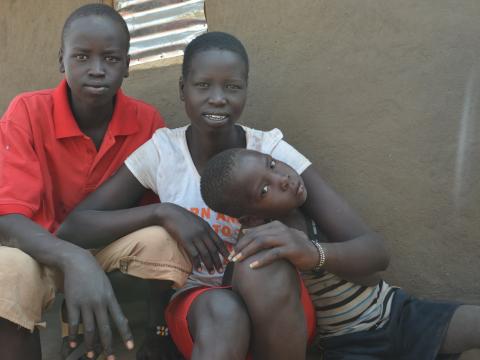Adjumani refugee settlements grapple with child headed families

Flavia Lanyero
Adjumai
Mary Awuol is a seventeen year old girl living in Nyumanzi settlement in Adjumani district in Uganda. Having fled South Sudan in 2014, Mary crossed to Uganda at 17 with two other siblings as unaccompanied children. Her siblings are 15 and five years old.
During their exodus to Uganda from South Sudan, many children have been exposed to severely traumatising events such as fighting, abduction, separation from their family members and witnessing family members and relatives being killed.
Thanks to the Uganda government, these children were received and registered at the reception centre and later relocated to Nyumanzi settlement which they now call home.
As the head of the family, Mary has to ensure that she gets monthly food ratios for the family, prepare the food , are bathed and have a proper place to sleep. Their father died during the war while they do not know where their mother
According to Mary, they as children lack a number of necessities despite the fact that they have the basics of food and shelter provided by the World Food Programme and government of Uganda respectively.
Through the World Food Programme, World Vision is supplying food to all refugees in Adjumani including; cone meal, beans, cooking oil and soy.
“But we still cannot afford sugar so we do not have breakfast. This is because we do not have money to buy the sugar. We also eat our food boiled because we cannot afford tomatoes or onions,” Mary says adding that her five year old brother is always worried and keeps crying wondering where the mother is.
Mary’s is just one of many children heading families in Adjumani. According to UNHCR statistics of September 2014, approximately 96,001 refugees (65% children) have been settled in Adjumani District. At least 3% of children at the point of initial registration have been identified as Separated/Unaccompanied. This leaves a significant number of children and adolescents unattended to and with no guidance, thus exposing them to further risk of abuse.
“These children, especially the most vulnerable, unaccompanied and separated children and adolescents, have been exposed to further physical, emotional and psychosocial abuse. Additionally, difficulties in accessing food, water, education, livelihoods, recreation and other services increases children’s exposure to stressful situations on a daily basis,” a World Vision situation analysis for the response reads in part.
At the reception centre, these children are given foster families to ensure that they have eaten, bathed and have shelter.
According to Ms Mary Nyankir, a teacher at World Vision’s Early Childhood Delopement centre, these children are hardly interested in learning or playing with their colleagues and are very emotional.
“Many of the younger children miss their mothers and cry very often. We have to teach them at a slower pace while giving them time to catch up,” Ms Nyankir says adding that many of the child family heads like Mary have been deprived of education since they have to keep at home to take care of their vulnerable siblings.
For now, World Vision has set up Child friendly spaces where many of the traumatised children are given space to play and interact with their colleagues.